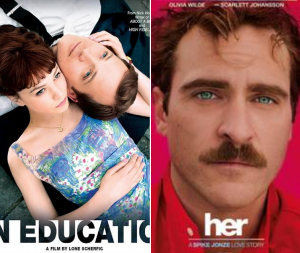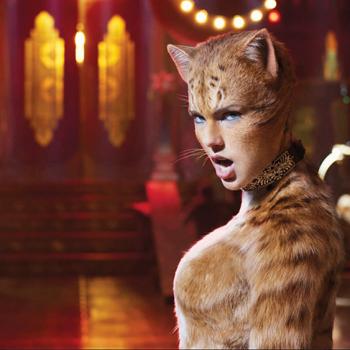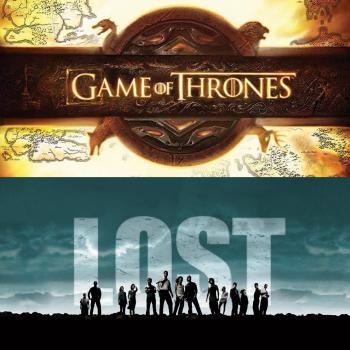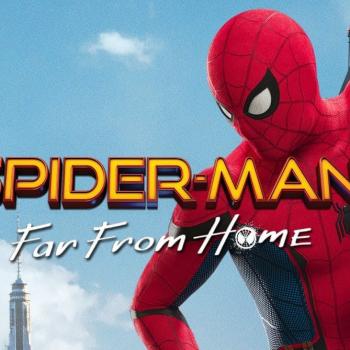
Looking for something to watch when you Netflix and chill? Here’s a quick take on two stories about complicated romances available now on streaming.
As well as some thoughts about the real-life dangers of believing in romance as possession.
WARNING: Some light spoilers ahead…
.
.
.
- AN EDUCATION, based on a true life event, about a 16 year old British girl who gets seduced by an older man who turns out to be a con artist and an adulterer. Beautifully written and shot. Peter Sarsgaard is wonderfully nuanced (and therefore terrifying). It’s always fun to play “Which of the Twelve British Actors will make a cameo?” And I’m thrilled that the amazing female English teacher saves the damn day. However, it was HELLA scary: emotional horror story, as ’twere. “Don’t go to Paris with that dude! He has a chainsaw for your SOUUUUUUL.”
- HER, starring Joaquin Phoenix’s unfortunate mustache, and Scarlett Johansson’s manic pixie dream voice, about a recent divorcé who falls in love with his semi-sentient operating system. An interesting concept, especially in this age of technological connect and disconnect, but I’m with Olivia Wilde’s character who calls Phoenix’s character “creepy.” (Maybe it’s the horn rim glasses, bushy mustache, AND high waisted Civil War pants, but…c’mon.) More frustrating, Johansson’s OS Samantha, although given some stabs at autonomy and wants and needs and desires, truly serves as a lonely fellow’s “perfect girlfriend” wet dream: an idea which receives the barest criticism by the end…at which point they just kill the OS. A bit of a rambling disappointment as a movie. Would have preferred a female writer on the project.
Born Sexy Yesterday
In watching both movies – An Education adapted by a man from a woman’s memoir, and an all-male crew writing a movie called Her – I was struck by the different views on female coming-of-age autonomy: from an insider perspective, and an idealized outside POV.
The Pop Culture Detective has a great video called Born Sexy Yesterday (see below), which criticizes especially sci-fi flicks for continuing to popularize not only the “manic pixie dreamgirl” trope, but to put a new spin on it, “born sexy yesterday.”
In the BSY trope, a truly powerful, fascinating lady is infantilized by being literally new to the world and therefore falling in desperate love with the first Joe Schmoe that comes along to teach her mundane things like how to make toast. Because she lacks comparison to anything else (like how to make Beef Wellington), our “hero” gets to do absolutely nothing like it’s a great triumph of sexual prowess.
Her practically swandives into the BSY trope, with Scarlett Johannson’s incorporeal Samantha making Joaquin Phoenix’s rather dull Theodore the center of her world, despite the fact that she – along with other OS systems – can, oh, read zillions of emails in a fraction of a second, or reanimate the dead in the virtual world. She coos about Theodore’s writing. She is desperate to make love to him. (Their initial sex scene is absolutely hysterical. A black screen and poor Johannson making all sorts of noises in the audio recording booth. Yeah, just about what a guy can handle. *facedesk*)
As the OS Samantha starts coming into herself, we’re invited to see it as a betrayal of Theodore’s reluctant love – rather than a triumph of a woman discovering her own autonomy instead of being duped into tethering herself to the first fellow that she meets. Because a manic pixie dream girl, or a BSY, is only “good” insofar as she soothes the ego of our unremarkable protagonist. She is “bad” when her existence takes precedence over the selfishness of the “hero.”
Compare this to An Education, which is also a sexual coming of age story – albeit, based on a real-life memoir. Jenny, played by then newcomer Carey Mulligan, is desperate for more than her provincial life. She’s sheltered, but smokes cigarettes. She’s got a beau, but finds him rather boring. She’s studying Latin, but would prefer to study life. Enter the dashing older man, David, who’s everything her safe life isn’t: who goes to concerts in London, and jazz clubs, and holidays in Paris and…also steals stuff from old ladies, and gets her parents drunk in order to con them, and doesn’t know that C. S. Lewis was called “Jack.” (Perhaps one of his most egregious faults.)
Like Samantha, Jenny is remarkable. She speaks French. She plays the cello. She’s top in her English class. She’s smart. Like Samantha, Jenny is whisked away by her own romanticism: albeit Samantha fell in with unremarkable Theodore, and Jenny pursues race car owning David. Both women are at once immensely capable, and immensely naive.
But compare the male fantasy of how Joe Schmoe would totally rock a woman’s world just by his mumbling sexty descriptions (and provided the woman’s a BSY and has no comparison), vs. Jenny’s reality post losing her virginity to a man who’s had several mistresses and fathered a child with his wife, but:
JENNY. (At the window, looking out.) All that poetry and all those songs, about something that lasts no time at all.
DAVID. (On the bed; quietly, distant.) …Yeah.
Although Jenny doesn’t have any comparisons, either, she still maintains herself. She knows things are meant to be better. And it’s this knowing that allows her to find a spine in the last act of the film. When she discovers that David is married, and goes to meet his wife – only to learn that she’s far from the first David’s seduced. When she goes to beg for her spot back at school, demanding to be seen as a woman – only to be told by Emma Thompson’s headmistress (yeah, EMMA THOMPSON!), “You’re not a woman. You’re a girl.”
Because, in fact, a woman knows what she wants. A woman isn’t born sexy yesterday. A woman knows how to spot a Joe Schmoe – whether with a mustache or a racing car. And a woman, like Jenny, can go to her teacher who tried to warn her, and ask for help: one of the first truly grown-up things she does.
A Reward for Learning – Beyond the Madonna and Whore
In An Education, one of the more striking things to note is that while the many women – from Jenny’s mother to the headmistress, her female teacher to David’s wife – all try to caution Jenny from the course she’s pursuing, not one of them shames her. They may chide her. They may try to convince her. But largely, they check in with her. Is she all right? Is she in the family way? Is she using protection? Is she protecting her heart? And ultimately, it’s this very circle of femininity that helps Jenny find her way out of her unfortunate entanglement and into Oxford and a more fulfilling life.
This is what happens when women write their own stories.
As opposed to Her which punishes Samantha’s character as she become autonomous and starts questioning the status quo she’s been given. When her advances are turned away by Theodore, when her declarations of love aren’t returned, when she starts chatting with other humans and making decisions for herself, she’s punished for being a virtual whore – first by Theodore’s feelings of betrayal, and then by the OS-es’ collective decision to…commit suicide? (The world building gets very nebulous at the end.) Because Theodore’s love is based upon possession, and Samantha is literally his possession, any move from Samantha into anything other than blind and unwarranted devotion is worthy of death.
This is incel-thinking. This is rape-thinking. This is toxic masculinity, wrapped up in Joaquin Phoenix’ soulful eyes, and a ukelele song.
I would have loved for a version of Her to be more like An Education. I would have loved for the “Born Sexy Yesterday” trope to have been turned on its head, truly shook out and examined, and for Theodore’s character to have realized that he cannot quantify love by possession.
David in An Education knows he’s conning women. When he’s given the chance to come clean, he takes the coward’s way and skives off. He knows that he has made himself unworthy and incapable of love. There’s a craven honesty in that.
But Her’s Theodore is left to feel some sort of empowerment by the fact that he “deserved to possess” love, even if he admits he’s not perfect: his idealization of possession as perfection remains unchallenged. And that’s worrisome.
Yours, Mine and Ours
But why is any of this important? Well, as mentioned in previous articles about compliance and consent, as well as Dating in a #MeToo World, the safety of women in romantic situations should not be unconsidered. And part of a woman’s safety is in knowledge.
What does art do, but teach us what’s “normal.”
To hold, as ’twere, the mirror up to nature.
Young men and women seeing An Education might get a better cautionary tale than seeing Her. Because we really don’t need more exultation of possession-as-romance held up for anyone to emulate.
This was brought home to me recently in a text conversation with two young men with whom I was chatting lately, one British, one American (I’ll call them by their nationalities) who both crossed over into that creepy possessive thinking, albeit in different ways.
The American seemed to fall head over heels. Lots of “Yours, yours, yours” language. Which weirded me out, because I have my own issues that I’m working through. And yet, he was still attempting to give. (Perhaps not picking up on the fact that I’m reluctant to take, but at least he offered rather than imposed.)
The British guy, who has since been hard ghosted by yours truly, began in a vastly romantic vein. Very David, without the sports car or the wife. However, after a month his language changed from reciprocity of interest to creepy possessive language, calling me “my” and “mine,” using the words “take, pin, lunge,” and even demanding that I use the language of “yours” back to him.
Rapacious language. Possessive language. The language of someone who doesn’t know his own self-worth and so will force it out from others, all under the lure of romance. All under the moniker of “But I’m a really good guy!” All under the ideology that he is somehow owed.
After that encounter (happy the day we can simply swipe, delete, and not allow someone to contact us ever again), I considered how the only way I’d recognized his language as rapacious was because of comparison. Because of other handsome men with whom I’m also chatting who know how to dance rather than demand. Because, unlike Jenny or Samantha, I am less naive. How knowledge kept me safe(ish) from a would-be attacker.
I thought, as well, of the bill of goods many of us were and are sold in the “purity cult” promulgated under the mask of sanctity. The Disney sanctioned “The One;” the romance that the first man you meet who’s even vaguely romantische will require you to look no further, and is inherently more perfect than any other man…rather than the actual fairy tale truth that your first boyfriend isn’t THE Prince Charming. He’s just this guy, y’know?
I worry for people who marry the first person they ever date. I’m sure some end up well. I wonder how many others put up with being possessed, rather than ever exploring what they want, need – indeed, what they were made for – simply because they lack comparison. Simply because they lack knowledge.
I worry for people who, in thinking they can avoid the fall of Eve, never eat from any of the fruit in the garden, and simply starve away. Rather than those who perhaps eat of the “wrong tree”…but now, they can recognize a snake.
 Picture courtesy of Sony Pictures and Warner Bros.
Picture courtesy of Sony Pictures and Warner Bros.
WE NEED YOUR SUPPORT! You can keep the Pop Feminist going to the tune of $1/month by becoming a patron on Patreon today!












